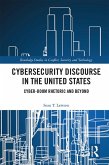Cyber Security Politics (eBook, ePUB)
Socio-Technological Transformations and Political Fragmentation
Redaktion: Dunn Cavelty, Myriam; Wenger, Andreas
0,00 €
0,00 €
inkl. MwSt.
Sofort per Download lieferbar

0 °P sammeln
0,00 €
Als Download kaufen

0,00 €
inkl. MwSt.
Sofort per Download lieferbar

0 °P sammeln
Jetzt verschenken
Alle Infos zum eBook verschenken
0,00 €
inkl. MwSt.
Sofort per Download lieferbar
Alle Infos zum eBook verschenken

0 °P sammeln
Cyber Security Politics (eBook, ePUB)
Socio-Technological Transformations and Political Fragmentation
Redaktion: Dunn Cavelty, Myriam; Wenger, Andreas
- Format: ePub
- Merkliste
- Auf die Merkliste
- Bewerten Bewerten
- Teilen
- Produkt teilen
- Produkterinnerung
- Produkterinnerung

Bitte loggen Sie sich zunächst in Ihr Kundenkonto ein oder registrieren Sie sich bei
bücher.de, um das eBook-Abo tolino select nutzen zu können.
Hier können Sie sich einloggen
Hier können Sie sich einloggen
Sie sind bereits eingeloggt. Klicken Sie auf 2. tolino select Abo, um fortzufahren.

Bitte loggen Sie sich zunächst in Ihr Kundenkonto ein oder registrieren Sie sich bei bücher.de, um das eBook-Abo tolino select nutzen zu können.
This book examines new and challenging political aspects of cyber security and presents it as an issue defined by socio-technological uncertainty and political fragmentation.
- Geräte: eReader
- ohne Kopierschutz
- eBook Hilfe
- Größe: 0.83MB
Andere Kunden interessierten sich auch für
![Cyber Security Politics (eBook, PDF) Cyber Security Politics (eBook, PDF)]() Cyber Security Politics (eBook, PDF)0,00 €
Cyber Security Politics (eBook, PDF)0,00 €![Routledge Handbook of International Cybersecurity (eBook, ePUB) Routledge Handbook of International Cybersecurity (eBook, ePUB)]() Routledge Handbook of International Cybersecurity (eBook, ePUB)46,95 €
Routledge Handbook of International Cybersecurity (eBook, ePUB)46,95 €![Crypto-Politics (eBook, ePUB) Crypto-Politics (eBook, ePUB)]() Linda MonseesCrypto-Politics (eBook, ePUB)35,95 €
Linda MonseesCrypto-Politics (eBook, ePUB)35,95 €![Cybersecurity Discourse in the United States (eBook, ePUB) Cybersecurity Discourse in the United States (eBook, ePUB)]() Sean T. LawsonCybersecurity Discourse in the United States (eBook, ePUB)43,95 €
Sean T. LawsonCybersecurity Discourse in the United States (eBook, ePUB)43,95 €![Routledge Handbook of International Cybersecurity (eBook, PDF) Routledge Handbook of International Cybersecurity (eBook, PDF)]() Routledge Handbook of International Cybersecurity (eBook, PDF)46,95 €
Routledge Handbook of International Cybersecurity (eBook, PDF)46,95 €![Global Digital Data Governance (eBook, ePUB) Global Digital Data Governance (eBook, ePUB)]() Global Digital Data Governance (eBook, ePUB)0,00 €
Global Digital Data Governance (eBook, ePUB)0,00 €![Crypto-Politics (eBook, PDF) Crypto-Politics (eBook, PDF)]() Linda MonseesCrypto-Politics (eBook, PDF)35,95 €
Linda MonseesCrypto-Politics (eBook, PDF)35,95 €-
-
-
This book examines new and challenging political aspects of cyber security and presents it as an issue defined by socio-technological uncertainty and political fragmentation.
Dieser Download kann aus rechtlichen Gründen nur mit Rechnungsadresse in A, B, BG, CY, CZ, D, DK, EW, E, FIN, F, GR, HR, H, IRL, I, LT, L, LR, M, NL, PL, P, R, S, SLO, SK ausgeliefert werden.
Produktdetails
- Produktdetails
- Verlag: Taylor & Francis eBooks
- Seitenzahl: 286
- Erscheinungstermin: 15. Februar 2022
- Englisch
- ISBN-13: 9781000567137
- Artikelnr.: 63312687
- Verlag: Taylor & Francis eBooks
- Seitenzahl: 286
- Erscheinungstermin: 15. Februar 2022
- Englisch
- ISBN-13: 9781000567137
- Artikelnr.: 63312687
- Herstellerkennzeichnung Die Herstellerinformationen sind derzeit nicht verfügbar.
Myriam Dunn Cavelty is deputy head of research and teaching at the Center for Security Studies (CSS), ETH Zurich, Switzerland. Andreas Wenger is professor of international and Swiss security policy at ETH Zurich and director of the Center for Security Studies (CSS), Switzerland.
1. Introduction: Cyber security between socio-technological uncertainty and political fragmentation Part I: Socio-technical transformations and cyber conflict trends 2. Influence operations and other conflict trends 3. A threat to democracies? An overview of theoretical approaches and empirical measurements for studying the effects of disinformation 4. Cultural violence and fragmentation on social media: Interventions and countermeasures by humans and social bots 5. Artificial intelligence and the offence-defense balance in cyber security 6. Quantum computing and classical politics: The ambiguity of advantage in signals intelligence 7. Cyber space in space: Fragmentation, vulnerability, and uncertainty Part II: Political responses in a complex environment 8. Cyber uncertainties: Observations from cross-national wargames 9. Uncertainty and the study of cyber deterrence: The case of Israel's limited reliance on cyber deterrence 10. Cyber securities and cyber security politics: Understanding different logics of German cyber security policies 11. Battling the bear: Ukraine's approach to national cyber and information security 12. Uncertainty, fragmentation, and international obligations as shaping influences: Cyber security policy development in Albania 13. Big tech's push for norms to tackle uncertainty in cyberspace 14. Disrupting the second oldest profession: The impact of cyber on intelligence 15. Understanding transnational cyber attribution: Moving from 'whodunit' to who did it 16. Conclusion: The ambiguity of cyber security politics in the context of multidimentional uncertainty
1. Introduction: Cyber security between socio-technological uncertainty and political fragmentation Part I: Socio-technical transformations and cyber conflict trends 2. Influence operations and other conflict trends 3. A threat to democracies? An overview of theoretical approaches and empirical measurements for studying the effects of disinformation 4. Cultural violence and fragmentation on social media: Interventions and countermeasures by humans and social bots 5. Artificial intelligence and the offence-defense balance in cyber security 6. Quantum computing and classical politics: The ambiguity of advantage in signals intelligence 7. Cyber space in space: Fragmentation, vulnerability, and uncertainty Part II: Political responses in a complex environment 8. Cyber uncertainties: Observations from cross-national wargames 9. Uncertainty and the study of cyber deterrence: The case of Israel's limited reliance on cyber deterrence 10. Cyber securities and cyber security politics: Understanding different logics of German cyber security policies 11. Battling the bear: Ukraine's approach to national cyber and information security 12. Uncertainty, fragmentation, and international obligations as shaping influences: Cyber security policy development in Albania 13. Big tech's push for norms to tackle uncertainty in cyberspace 14. Disrupting the second oldest profession: The impact of cyber on intelligence 15. Understanding transnational cyber attribution: Moving from 'whodunit' to who did it 16. Conclusion: The ambiguity of cyber security politics in the context of multidimentional uncertainty







